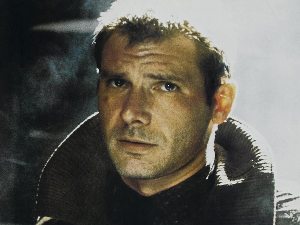Blade Runner (1982)
[10]
Blade Runner tackles one of science fiction's biggest questions: what makes us human? The story by Philip K. Dick is a sci-fi allegory for soldiers returning home with post-traumatic stress, wrapped in the veneer of a neo-noir detective story -- all in all, a beguiling blend of genres and content. Harrison Ford plays the detective, Dekkard, a world-weary loner hired to hunt androids (here called replicants) in need of 'retirement'. The notion is that the replicants were created for war, and once they're done fighting, they can't possibly reintegrate back into society. But where real-life soldiers risk losing part of their humanity through warfare, the replicants allege to have discovered theirs -- if not through battle, through the things they've seen and experienced across the universe.
The fact that there are other characters judging who or what is human, and who or what should live or die — well, then you’re talking slavery. And when you consider how gorgeous and accommodating the female replicants in the movie are, then you’re also talking sexual slavery. It’s not a major plot element, but it’s there. And there’s a lot more in Blade Runner — it’s a film almost as rich in content as it is in visual splendor.
The most striking part of the story is the calling into question of the main character’s identity — is Dekkard a human or a replicant? It’s a rare and splendid last-minute brainteaser that makes you rethink the entire movie. (This idea is something you won’t find in the original theatrical version of the film, but it is included in almost every other version since, including Ridley Scott’s latest ‘final cut’ of the movie.)
Blade Runner is highly-regarded for its scrumptious aesthetics. The sets, costumes, music, and stylistic lighting are often imitated, a huge influence in the birth of music video. You even see the inspiration in movies today. I have to think steam-punk owes a debt to Ridley Scott. The visual effects are astounding without even taking into account when the movie was made. If there’s anything I’m ambivalent about, it’s the music by Vangelis. It’s very distinct and well-loved by fans, but I think it overemphasizes the exotic qualities of a movie that is already exotic as hell.
Blade Runner comes off cold and impassive to many. Dekkard is not a warm and fuzzy guy and most of the supporting characters are just quirky enough to keep your emotional investment at bay. But I think with great science-fiction, we’re really meant to invest in the themes and content, which is intrinsically emotional in Blade Runner. And it’s not that the characters are under-written or under-performed — it’s that most of them are proto-human, just beginning to recognize and explore their humanity.
Oscar Nominations: Best Art Direction, Best Visual Effects


